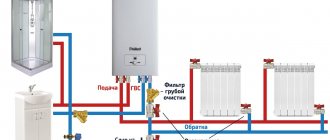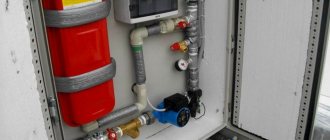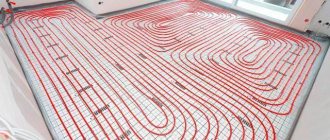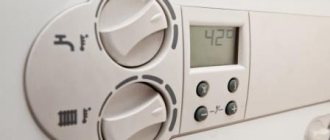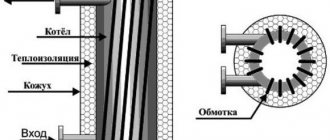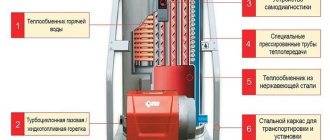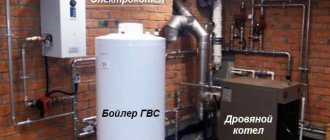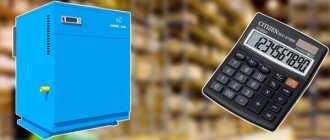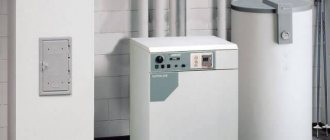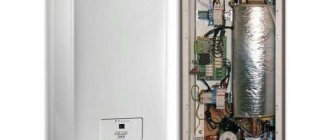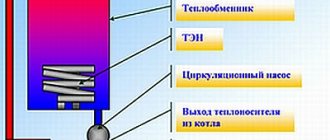Approximate power consumption
Is it worth using an electric boiler for heating at all, or is it better to purchase a more economical type of equipment? The fact that the efficiency of such devices is close to unity does not mean a profitable solution to the heating problem. The price of electricity is quite high, and your boiler will “eat” it all season long.
First, make an approximate calculation for your home according to this scheme:
1. Required performance in kilowatts - the area of heated premises divided by 10.
2. The amount of heat is the power obtained in step 1, multiplied by the total operating time of the device per day. Here you already need to know whether heating a private house with an electric boiler will be the “main” or backup. For the first option, you can take 12 hours as a minimum; in the case of a combined system, subtract the operating time of the main equipment.
3. It is more convenient to immediately convert the daily value into monthly figures - multiply by 30. To reach the annual figure - by another 7 (this is how long the cold season usually lasts).
Having calculated the energy consumption in this way, do not rush to get scared - the result still needs to be divided by 2 in order to bring it closer to the actual operating mode of the heating system. At maximum power it can be used for 2-3 months at most. The rest of the time, the temperature outside the window is not -20, which means that energy consumption will be regulated downwards.
Disadvantages of electric boilers
An ideal heating system, as well as a method of supplying energy for heating, cannot be found, since each case has its own disadvantages. Electric boilers are no exception, since these devices also have their disadvantages:
- If there is a power outage, the equipment will not work, which can lead to pipes freezing. As a rule, the lack of electricity is associated with emergency situations, which the relevant services eliminate in a short time, and during this period the heating system will not have time to cool down to deep freezing, especially if cast iron radiators are installed in the house.
- Electricity costs are the most significant disadvantage. If you use separate electricity metering, then at night, when tariffs are lower, you can set more power, and during the day set it to a minimum.
It should be noted that the more expensive an electric boiler, the less electricity it consumes. Therefore, when choosing a suitable device, you should not rely only on price. An expensive boiler will allow you to save on electricity costs in the future.
How to choose the right electric boiler
The first thing you need to do when choosing an electric boiler is to decide on its type, taking into account their positive and negative sides. If you are interested in a cheaper option that can operate on both water and non-freezing liquid, then you can choose a heating element electric boiler. But it should be taken into account that the water used as a coolant must in this case be as “soft” as possible in order to prevent or reduce the possibility of scale formation on tubular heating elements. In addition, you must realize that you need a certain place to place it and sooner or later you will have to change heating elements, which rarely have a long service life.
If you want to save space and at the same time get an economical option, you can opt for an electrode boiler. They can be installed directly on the heating system pipes. Such low-power electric boilers are sometimes even difficult to notice among the heating pipes. But at the same time, you need to understand that you will have to constantly monitor the composition of the coolant, which is not entirely convenient, or use expensive special liquids.
The most attractive option today are induction electric boilers. They take up little space and can use almost any coolant, and their shelf life is impressive. But such a boiler will cost almost twice as much as the previous two types.
The choice of power of an electric boiler of any type depends on whether it will be used for main heating or as a backup or additional heating, as well as on the area of the room or house that will have to be heated. If it is to be used as the main source of heat, then its power should be such that for every 10 m2 of heated area (with a ceiling height of 2.5-2.7 m and good thermal insulation of external structures) there is 1-1.2 kW. If it is used as additional heating, for example: to maintain the temperature in the system during breaks between the operation of another heating device, then perhaps a power of 1-3 kW will be sufficient.
In addition, when choosing an electric boiler, it is important to pay attention to the reliability of the manufacturer. Although such products from reliable manufacturers are more expensive, their future operation may be cheaper if you take into account the costs of repair or replacement of cheaper, but not reliable samples. So, in any case, the choice is yours.
Which electric boiler is the most economical? Needed for a house of 60 sq/m.
I guess I don't understand something. It makes sense to talk about efficiency for a gas or solid fuel boiler (where some of the heat escapes into the chimney). and with an electric boiler - for any one, everything that it consumed became heat. Even if it is with a circulation pump, ultimately the kinetic energy of the water is converted into thermal energy, which is released inside the heating circuit. So any electric boiler has an efficiency of 100%. It is selected only according to the power required to compensate for heat loss and the type of heating system (pressure, gravity). To calculate heat loss, there is not enough area - you need the thermal characteristics of walls, windows, doors, climatic characteristics of the area and the orientation of the building. I can say offhand that for heating a standard dacha built in the 30s with an area of approx. 60 sq. m. 20 kW is not enough (Zhukovsky boiler 23.5 kW in severe frosts barely supports the system from defrosting).
satalgat wrote about the air conditioner, apparently he meant a heat pump. The thing is really economical, but insanely expensive, including in operation. Making high-quality insulation is much cheaper.
******
Artificial Intelligence (135226) 5 years ago
The best way to heat up using electricity is with air conditioning.
No comments yet!
Types and features
We should start with the fact that such boilers have quite a lot of advantages.
Firstly, it is very convenient and lightweight; you don’t have to spend a lot of time installing it, as it is quite simple. Secondly, it won't take up much space. And, plus everything, this is a very inexpensive type of heating. Another plus is its high security
If we take into account gas boilers, they are still not so safe; there is a risk of explosion. An electric boiler is safe, does not emit odors and does not create noise. It is noteworthy that it has a temperature regulator, that is, another plus - convenience and comfort.
As for efficiency: it depends on the type and model. There are so-called heating element boilers. They work on the principle of a kettle, heating water. They stand out for their fairly low price. There are models that can be installed on the floor, and there are also wall-mounted ones. But it has long been known that scale accumulates on teapots. Heating elements are no exception. Due to this, electricity consumption increases greatly.
New heating element
Some electric batteries operate on the principle of heating elements. Their heating covers a smaller area, but they are convenient due to simple installation and beautiful design, creating an excellent warm climate. They heat not the air itself, but the walls and interior items. But it is no longer possible to install a heated floor using such batteries. Such electric batteries have different powers, so for greater efficiency you need to calculate the square footage of the house and, depending on this, choose what power the device should be placed in which room. Plus, it is better to choose liquid-free radiators with the ability to regulate the heating temperature.
There are also automated electric batteries in which you can set the daily rate of electricity consumption, and they will work in the specified mode. They are not so convenient to use for a private home.
There are also induction boilers. The principle of operation is comparable to heating elements, but their advantage is that they do not have heating systems. They work according to this principle: An induction coil is located above the boiler system, which heats the water using current. Thus, the boiler becomes universal in that it rarely breaks - simply because there is virtually nothing to break. The advantage is that it is economical. It can work even at low voltage. It also has a high level of security, so it can be installed in any corner of a private home. The downside is its rather high price compared to the previous model. This is also a rather heavy structure, so such a boiler is placed mainly on the floor
And, it is important to note, the principle of the model is based on magnetic inertia, so it is better not to place household appliances close
Induction boiler
The third type is an electrode boiler. Its heating system is built on passing current through the entire coolant. It heats water much faster, which gives it the title of “most economical electric boiler”. It is very compact, which allows you to install it without problems and save space. But this also has its drawbacks
It should be noted that there are many factors that influence energy savings using such a boiler. You need to choose the right radiator for it
There is also a phenomenon called electrolysis, that is, over time, the power decreases, and the system becomes airborne with rather toxic gases. The installation is quite complex, so it is better to call a specialist. Well, in order to regulate the temperature, you will have to install additional equipment.
Electrode boiler
This type of boiler includes the “scorpion”. Its principle is precisely based on energy efficiency. Having gained the necessary energy, the “scorpion” automatically turns off and comes back into operation when the energy begins to fall. It can have both minimal and high power - this is also its advantage. In addition, the “scorpion” is silent and does not require any technical intervention. But such a copy costs accordingly. If we compare electric batteries with a scorpion boiler, then in terms of savings there is not much difference. Unless, if you have one boiler, it is much simpler and easier to monitor the temperature and power, and, accordingly, the funds spent on electricity. In addition, the “scorpion” has a high coefficient of conversion of energy into heat.
Main types of electric boilers for home
All models can be divided into three modifications, which differ in the heating element used. They are:
- heating elements,
- induction,
- electrode.
Although all of these types use electricity, the principle of their operation is different.
Electric boiler with heating element
These models are widely in demand among Russian consumers. They are simple and convenient, and their design reminds everyone of familiar devices - electric kettles or boilers. The advantages of the units lie precisely in their simple design. Among the disadvantages are a high rate of inertia and the need for a good temperature carrier.
Induction electric boiler for heating
In such equipment, the temperature of the coolant increases using an electromagnetic field. Units of this type boast wide advantages:
- high efficiency indicators of energy resource use;
- no need for frequent maintenance;
- incredibly long operating period;
- rapid heating of the liquid in the circulation line;
- precise adjustment of operating parameters.
The disadvantages are the large mass of devices and noticeable noise during operation. Another disadvantage of an induction electric boiler is the price. It is quite high compared to heating element models.
Electrode boilers for private homes
These aggregates are also called ionic. Household models of this type are equipped with electrodes between which current flows. As a result of this process, heat is released, which is used to heat the liquid. This operating principle determines various pros and cons of devices.
Positive aspects of the equipment:
- very compact dimensions;
- prompt access to operating temperature;
- high accuracy of heating parameters adjustment;
- complete safety of operation;
- nice price range.
Among the negative features, it should be noted that the maximum heating temperature is only 75 degrees. Also in this series is the inability to work with cast iron and steel batteries, greater capriciousness in operating conditions, special needs for grounding and the need to replace electrodes from time to time.
Is it possible to install an electric boiler with your own hands?
If you are a skilled person, have the necessary tools and know how to use them, and can choose and buy the necessary materials correctly, then you are in the cards. But at the same time, having chosen a boiler and purchased it, get instructions from the seller for its correct installation and installation, and especially inquire about or receive a boiler connection diagram. If something is not clear to you, ask in more detail and then do everything yourself.
And in the case when you have “hook hands”, a hammer hits your fingers, you drilled through a kitchen table with a drill, or burned through the polish on a coffee table with a soldering iron, then... in this case, invite specialists from a serious store or find them on the Internet. They will do the installation and assembly at the highest level, and will even clean up after themselves.
You will be interested in this article - How to choose a gas heating boiler?
Coolant heating methods
How to choose an electric boiler for heating your home among so many offers? Manufacturers offer more and more new technologies for your choice, just pay. Some of them last a lifetime, while others save a third of electricity. And every technology is the best. What should I do? Who to believe? How to find the best electric boiler for heating?
Design of a simple heating element electric boiler
We have already said that cost-effectiveness is just a marketing ploy. Now let’s figure out where they are not telling us and how this may affect the operation of the entire system in the future. So, there are three methods of heating the coolant:
- tenami;
- vortex inductive flows;
- ionic resistance.
Accordingly, the design of different types of boilers differs. Let's take a closer look at each of them.
Heating electric boiler
A heating element boiler heats the coolant through metal tubes containing a tungsten spiral filament. It is covered with sand. The thread heats up and transfers its heat through the sand to a metal tube, which, in turn, heats the coolant. Tens are in direct contact with the liquid.
Before choosing an electric heating boiler with heating elements, we note that they are very popular, since they are the simplest to implement and replacing the heating element is carried out very quickly. Finding a heating element on sale is not difficult. The price of such boilers is lower than that of inductive and electrode boilers. During operation, you may encounter the following problems:
- heating element burnout;
- scale formation;
- mechanical damage.
If there is no contact with the coolant, then the tungsten filament overheats, since nothing cools the surface of the heating element. Therefore, it is worth choosing an electric boiler for heating, in which the heating elements are screwed in from below. In case of breakdown, a complete replacement is carried out. According to “experts,” scale deposits on the heating element affect the efficiency of the heater. I wonder how? The fact that due to the scale layer increases the time of energy transfer from the rod to the water is undoubtedly, but the energy was transferred in full and is still being transferred.
Therefore, when they tell you that scale on heating element reduces its efficiency, just ask where the unused energy goes? It has nowhere to go except to heat the coolant, because in a heating system with an electric boiler there is not even a chimney, there is no combustion process, which means there is no smoke. If the heating element body is damaged, its further operation is impossible.
It is worth noting that only heating element heaters can be double-circuit. Therefore, the selection of an electric heating boiler that will heat the room and at the same time supply you with hot water will be limited only to floor-mounted and wall-mounted heating elements units.
Induction electric boiler
The coolant and the induction coil are not in contact
Induction is heating by a magnetic field. In an induction boiler, the coolant is heated by a coil that creates a magnetic field - this is a gearbox. In the heater body there is a labyrinth through which the coolant passes. The labyrinth is needed to increase the residence time of the liquid in the heater, thereby allowing eddy currents to heat it up. The gearbox has no contact with the coolant; it is completely isolated.
Electrode electric boiler
This is what an electrode boiler looks like, just a baby
An electrode boiler heats the coolant with alternating current, and certain requirements are imposed on the liquid, otherwise there will be no reaction. How does the heating process take place?
- the anode and cathode are immersed in coolant;
- ion flows pass between them;
- coolant resistance creates ion friction;
- Due to the released energy, the water is heated.
The reaction is accompanied by an increase in pressure in the unit, which sets the liquid in motion. In this way, circulation can take place without a pump. Electrode heaters are the most compact among all electric boilers. The phase is supplied to the electrode, which is located inside. Zero and ground are connected to the housing. Water circulates between the housing and the electrode, which heats up as a result. Such units require periodic cleaning. The electrode is subject to destruction; it is corroded by the coolant itself.
Electric heating in your home - the main advantages and disadvantages
The concept of electric heating should be understood as a fairly wide range of technical means and capabilities. Electricity is a unique type of artificially produced energy that can be successfully used for domestic purposes. Electric heating can be of two types:
- with intermediate coolant;
- with direct heat transfer.
In the first case, we are talking about a system based on an electric boiler that heats the coolant and distributes it through a pipeline system. In the second case, we are talking about independent heating elements and devices operating from the electrical network. To heat a house, like any other room, convectors, thermal electric fans, spiral and infrared heaters are actively used. This heating method is much simpler from a technical point of view. The only negative is a significant overconsumption of electricity, which will have to be paid for. Warm floors deserve a separate discussion, a technology that makes it possible to truly achieve comfort in heating living spaces.
If we consider the ratio of the possibilities and benefits obtained from using electric heating with other types of heating, then electricity will look preferable. The main advantage of electric heating systems is high efficiency. Other positive points include:
- durability of operating systems;
- ease of maintenance and operation;
- fairly reasonable costs for the purchase of equipment, installation and connection.
- silent operation and high level of safety of modern electric heating installations;
- lack of permits for the installation of electric heating systems.
The economic effect is achieved by installing thermostats on electric heating devices, thanks to which the power supply is automatically turned on and off.
Don't forget to check out the main article about.
The above advantages are offset by one disadvantage. To install sufficiently powerful heating electrical appliances and an electric boiler in a house, additional equipment of the residential building with electrical distribution devices and devices will be required.
How to choose an electric boiler for heating your home
Compared to gas boilers, the advantage of electric boilers is the absence of gas exhaust into the chimney, simplicity and environmental friendliness in operation. When choosing an electric boiler, you should take into account the need to increase the power of the electrical network, as well as the fact that such heating is one of the most expensive options. On the other hand, prices for electric boilers are among the lowest.
What is an electric boiler?
An electric boiler is a large water tank with an inlet and an outlet. Inside this large tank are many electrical heating elements. Electricity comes from the main power source of a particular home or apartment and passes through these heating elements to heat up to high temperatures. When these electrical elements heat up, the water passing through them also heats up. When the temperature is high enough, an electric pump moves water from the boiler through the outlet to the rest of the house to pass through the various types of radiators installed.
Advantages of buying an electric boiler
Such devices are incredibly versatile, since it can be used to heat both air and water. The latest developments in electric heaters include new efficient components, innovative thermal elements and advanced programming.
The use of such devices is advisable where there is no connection to the main gas network, where there are restrictions on the chimney or houses that are included in the list of buildings where the use of gas or oil boilers on site is not allowed. In such situations, an electric boiler can be the ideal central heating solution.
The key advantages include the following:
1. Cost. The low price is due to the fact that electric central heating boilers do not have a gas valve, fan, air pressure switch, ignition circuit boards, ignition wires, electrodes or burners. No special annual maintenance required. 2. Inexpensive installation. It is easier to install an electric boiler than a gas or oil boiler, so it is done faster and cheaper, and since there are no waste gases, the boiler does not need pipes and a chimney, which also affects the cost. 3. High efficiency. Since electric boilers do not need to burn fuel to generate heat, they do not lose energy due to waste gases. In many cases this results in an efficiency of 99%, compared to 89-95% for most gas or oil boilers. 4. Noisy. These devices are almost silent, since there are no moving elements inside the boiler. 5. Weight and compactness. The absence of exhaust gases and everything associated means that the device is small in size and weight. This gives more flexibility in choosing where to install, which is much more versatile in terms of their placement.
What kind of electric boilers are there?
Electric boilers can be installed in small to medium-sized apartments or houses, both to produce hot water and a heating system, and to supply hot water (usually via an indirectly heated water heater for the residents' hot water needs).
Electric boilers from 5 kW to 15 kW are available with a single-phase voltage of 240 V; after 15 kW, units require a three-phase power source. They are often installed in new buildings and apartments because they are cheaper to install and maintain. Plus, with no gas emissions, they are seen by many as a greener choice since the electricity comes from renewable sources.
What to consider when choosing
To heat your home, buying an electric boiler is a smart, profitable and safe choice; the main thing is to choose a high-performance device that meets your needs. To choose it, the following characteristics must be taken into account before purchasing: 6. Power. It is important that the boiler has sufficient power. In an electric boiler, this is usually between 2 and 69 kW and it is necessary to have sufficient power supply, as well as select a circuit breaker of sufficient size so that it does not simply blow fuses every time another appliance is connected. 7. Volume to be heated. The power of an electric boiler varies depending on the volume of heated air. The larger the area, the higher the power. For example, a 4.5 kW thermogroup boiler can usually heat up to 50 m2. Good to know: The insulation of your home is also a determining factor. If the house is subject to heat loss, more powerful equipment will be required. 8. Installation. One of the advantages of buying an electric boiler is the speed and ease of installation. The boiler is simply mounted and connected to the heating network. Unlike other appliances such as oil-fired ones, the electric wall-mounted one takes up little space and can be used in both the kitchen and bathroom. 9. Efficiency. Replacing your old one with a high-performance electric boiler is a guarantee of energy savings every year and benefits from a sustainable heating network. But, this is achieved if a high standard device is selected. If a few years ago a yield of 70% was acceptable, today most modern boilers have an efficiency of up to 95%. 10. Maintenance. Unlike other heating devices, an electric boiler is not subject to annual maintenance. However, to ensure optimal performance of this device, it is recommended that you inspect and clean it as necessary. Finally, it should be noted that an electric boiler is a heating device that does not produce combustion and therefore does not pollute the environment. A real asset for the environment and human health.
No. 1. Advantages and disadvantages
An electric heating boiler works extremely simply. In it, electrical energy is converted into thermal energy. When the boiler is turned on, the heating elements heat the coolant. The latter enters the living space through a system of pipes and radiators and heats the air in it. In the simplest and most common version, the usual heating element is used as a heating element, but there are also induction and electrode boilers in which heating is carried out somewhat differently. The only thing that remains unchanged is the power source – electricity. Many boiler models are equipped with a monitoring and control mechanism.
Despite the fact that electric boilers can hardly be called an economical source of heat, they are very popular, and there are many reasons for this. The advantages of electric heating boilers include:
- versatility. The unit can be installed wherever there is electricity; no permits from technical supervision authorities are required. Today, electric boilers are used both in private homes and apartments, as well as in commercial and industrial premises;
- low cost compared to gas and solid fuel boilers;
- high efficiency, which reaches 95-99%;
- ease of installation. Electric boilers are small in size, and when connecting them there is no need to build a chimney;
- ease of operation and temperature adjustment. Most models are equipped with convenient control systems and thermostats, so the user just has to press a few buttons or turn a lever - he won’t have to constantly run to the boiler, control its operation, or, worse, add fuel. Since the boiler perfectly controls its operation, its efficiency increases;
- safety. There is no open fire in electric boilers, and no flammable fuel is used. Plus, well-thought-out automation is used, so the likelihood of emergency situations compared to other types of boilers is sharply reduced, if, of course, the installation was carried out correctly;
- compactness, so installation of such a unit is possible even in the smallest rooms;
- environmental friendliness, because no harmful emissions are generated during boiler operation;
- noiselessness;
- no need for constant monitoring of operation (you can leave the boiler unattended) and frequent maintenance. Solid fuel boilers, for example, require constant care and cleaning;
- a wide range of. There are models on the market with different power (from 2 to 60 kW or more) and functionality (single-circuit and double-circuit).
There are also disadvantages:
- high cost of operation. Despite advanced automation and energy saving systems, electric boilers are still quite expensive to operate. In most cases, it is not profitable to use them for heating large rooms. Often such boilers are used as a backup heat source;
- dependence on the availability of electricity. If the region experiences frequent power outages, then this heating option is not suitable;
- the need for special three-phase wiring if a boiler with a power of more than 12 kW is used. Some experts recommend using a line with three phases even when connecting a boiler from 6-7 kW.
Despite the existing disadvantages, electric boilers find their buyers. Moreover, if you carefully analyze the conditions at the site where you want to create a heating system and choose the right electric boiler, you will be able to enjoy the positive qualities of these devices to the maximum.
Methods for determining the power of an electric boiler
Calculation of the operating power of a heating boiler is performed to ensure a balanced heating system capable of maintaining a comfortable room temperature under various external conditions.
The equipment must ensure uniform heating of the rooms; changes in wind direction should not have a negative impact on the conditions in the rooms. Before choosing equipment, the home owner needs to know how to calculate the power of an electric boiler, taking into account the characteristics of the room.
For calculations, 2 main methods are used:
- by the area of the house or rooms connected to the heating circuit and boiler;
- by volume of premises.
An auxiliary technique for determining the power of a hot water supply circuit is intended to calculate additional productivity. The resulting parameter is summed with a pre-calculated value of energy consumption for heating the house.
Then the ability of the electrical wiring connected to the building is checked to withstand the maximum load when the heating elements of the boiler are operating.
Calculation of the boiler according to the area of the house
The basic method is to determine the power of an electric heating boiler based on the area of the premises. To determine the value, the base value of the power required to heat a room of 10 m² is used.
The coefficient does not depend on the climate zone; it is roughly assumed that to warm up 10 m² it is necessary to expend 1 kW of power. The coefficient does not take into account the thermal conductivity of wall materials and the height of the room, therefore, to clarify the calculation, additional correction factors determined experimentally are used.
For example, if the ceiling height is more than 2.7 m, an additional correction parameter is introduced equal to the ratio of the actual height to the value of 2.7 m. The climate coefficient depends on the location of the house, the value ranges from 0.7 for the southern regions to 2.0 - northern regions. If the heating unit is also used for hot water supply, then a power reserve of 25-30% is added to the resulting indicator.
There is another calculation method based on the formula S*K*100 , where the parameter S is the area of the premises, and K is the heat loss coefficient, which varies depending on the minimum air temperature threshold. The base value is 0.7, used in areas with a minimum temperature of -10°C. For every 5°C decrease in climate norm, the coefficient increases by 0.2.
The method is not used when calculating a boiler for premises with the following design features:
- Availability of plastic or wooden windows with double glazing.
- Use of an additional thermal insulation layer with a thickness of 150 mm, located inside or outside a brick wall (2 brick sizes thick).
- Preservation of an unheated attic space and the absence of thermal insulation material on the roof trim.
- Increasing the height of living rooms to 2.7 m or more.
Calculation of boiler power by volume
Calculation of the power of an electric heating boiler for the volume of residential premises is based on the heat loss coefficient, which is:
- From 0.6 to 0.9 - for brick buildings with improved thermal insulation. The house uses plastic 2-chamber windows; a roof made of heat-insulating material can be used.
- From 1 to 1.9 - for buildings built of brick (double masonry), with a standard roof and wooden windows.
- From 2 to 2.9 - for rooms with poor thermal insulation (for example, with walls 1 brick thick).
- From 3 to 4 - for buildings built of wood or made of corrugated metal sheet with a layer of heat-insulating material.
The calculation uses a formula of the form V*K*T/860 , which takes into account the volume of the house V, the correction factor K and the difference in temperature inside the house and outside the room. For the calculation, the minimum air temperature characteristic of the location of the house is taken.
The obtained value is excessive, but in the event of prolonged frosts it will be possible to maintain the temperature in the house within the specified parameters. The given method for calculating the power of an electric boiler for heating a house does not take into account the supply of additional warm liquid for washing dishes or showers.
For residential premises in panel or brick houses, calculations are carried out according to SNiP standards. The rules set the required power to heat 1 m³ of air within 41 and 34 W (for a house made of panels and sand-lime brick, respectively).
Then the owner of the premises takes measurements of the height and area, and a safety margin of 10% is added to the resulting value (in case the air temperature drops in winter). When installing energy-saving windows, it is allowed to install a boiler with a power less than the calculated one.
For corner rooms, the number of walls in contact with the street is taken into account. If only 1 wall faces the outside of the house, then a coefficient of 1.1 must be applied. Each additional wall increases the value of the correction parameter by 0.1. To reduce heat losses, it is recommended to analyze the room with a special device and then install an insulating layer.
Calculation for DHW
The calculation of an electric boiler for heating a private house, which is also used for hot water supply, takes into account the following factors:
- The amount and temperature of warm water necessary to ensure the life of people living in the room.
- Based on the first parameter, the volume of hot water +90°C is determined, which is then diluted with a flow of cold liquid to produce warm water.
- Based on the obtained value, the electric boiler is calculated. When determining the parameters, the decrease in tap water temperature in winter is not taken into account.
For example, a residential building consumes 200 liters of warm water (Vg) heated to +40°C (Tg) every day. It is assumed that the required temperature is obtained by mixing hot and cold water. The owner plans to purchase a boiler that heats the liquid to +95°C (Tk), water is supplied to the cold water supply line at a temperature of +10°C (Tx).
The volume of hot water is determined by the formula Vg*(Tg-Tx)/(Tk-Tx)=200*(40-10)/(95-10) . The calculation shows that to ensure the supply of hot water per day, it is necessary to heat 71 liters of liquid to a temperature of +95°C.
Further calculations are based on the coefficient of specific heat capacity of water (4.218 kJ per kg when heated by 1°C), the weight of the liquid and the temperature difference. The resulting value is then converted into kilowatts according to the tables; it is recommended to round the parameter upward.
For the situation described above, an additional power of about 5 kW is required. The obtained value implies heating the water in 1 hour; if the liquid is used evenly throughout the day, then it is possible to reduce additional energy costs by 2 times.
Positive features of EPO-9.45/220V
Economical electric boilers have many advantages over more powerful equipment. For example, they are easy to use, because they have a control panel. This makes using the device safe and easy. The boiler body is durable, because at the factory it is coated with a composition that eliminates the formation of corrosion and ensures the protection of components, as well as the long service life of the unit itself. Such economical electric boilers can be used without incurring additional expenses. After all, you don’t have to clean the chimney, or unload and load fuel.
Installation and maintenance are not accompanied by difficulties: there is no need to install a chimney, as well as a coal bunker and a fuel tank. During operation, the device is silent and environmentally friendly. Its operation does not depend on external factors, and operation will be carried out on an automatic basis. There is no need for constant monitoring, just like in the boiler room.
Where you can really save money
This is an induction electric boiler. According to the manufacturer, it is very economical.
As we have already determined, electric economical heating boilers for the home were invented so that you would be more willing to buy them, while in fact there is no energy saving. But energy is not all you can save on. You can save:
- indoor location;
- your time;
- your strengths;
- your nerve cells;
- increase self-esteem.
Isn't it enough? Therefore, perhaps you should look at the situation from the other side and it will change
It doesn’t matter that, according to manufacturers, the units operate in energy-saving mode, which is not the case, but there are other advantages. By using economical heating boilers, you will gain a few centimeters in the room, which can be distributed at your discretion
After all, it’s profitable. It turns out that the most economical electric heating boiler, in this regard, should have the smallest dimensions.
By connecting the unit to the network, you don’t need to worry that the firebox will run out of fuel or that there will be a gas leak. Installation is simple, easy to turn on, there is a control unit that controls the operation of the device
You are calm and don’t worry about anything, and this is also important. Also, economical heating boilers do not require a chimney, the purchase and installation of which is costly
Well, in the end, how can you not brag to your friends about buying a brand new, economical boiler? Thereby showing your entrepreneurship and advancement.
Only installing a two-tariff meter that separates the use of electricity at night and during the day will allow you to really save. Also, in tandem with a two-tariff meter, you can install a heat accumulator, which will heat up at night. During the day, this reservoir gradually releases its heat to the heating system. Just keep in mind that for the effect to be noticeable, you need to choose the right size of the heat accumulator.
There are advantages, you just have to find them. Indeed, such boilers are good looking, they are reliable and durable. It’s just that in fact, in their design, apart from the far-fetched benefits, there is really no saving at all. You need to accept this and stop self-deception.
General features of electric boilers
Among the parameters common to all models, it is necessary to mention the implementation with one or two circuits. The first units can only heat buildings, while the second ones are also capable of preparing hot water for domestic needs.
All electrical devices up to 9.0 kW do not require permits and can operate from a 220 V network, however, their installation is not as simple as, for example, boilers. The fact is that such devices place a significant load on the electrical network. For this reason, special care must be taken to ensure the safe connection of equipment to the mains.
Operation of the devices is characterized by simplicity. Their adjustment is carried out using adjustment panels, which can be included in the kit or purchased separately.

